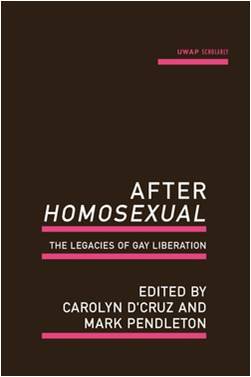
After Homosexual
Edited by Carolyn D’Cruz and Mark Pendleton
UWA Publishing
In recent years queer organisations in many parts of the world have stagnated. Focusing on the last remnants of legal equality such as marriage, they seem to have stopped questioning everything else. Forty years after the publication of Dennis Altman’s pivotal work Homosexual: Oppression and Liberation, a group of people have reflected on how this book changed their lives. As Anne Summers says, it is almost impossible to explain to those who were not there how different the world was back then. In the first section of the book, thirteen people write about what it was like to be persecuted and discriminated against because of a perceived difference. These personal accounts include battles for equality for race and gender as well as sexual orientation and the internal battles that some waged.
The revolutionary manifestos that were produced in the 1970s in the second part of the collection capture a moment in history when passions were high and rebellion was the only answer. Dennis Altman reminds the reader that gay liberation is more than liberation of homosexuals – “it is in fact liberation of us all”. Altman’s emphasis was always on “breaking out of the quite unnecessary narrow limits on the human potential that exists within our society” and actually creating a different existence that acknowledged everyone’s innate polymorphousness.
In the third section, seventeen writers share their thoughts on the victories and legacies of those times and question where society stands now. Many have some nostalgia for the times when more needed to be done and mourn the loss of radical critique. Forty years ago, Altman expected something different to today’s respectability and warned against the dangers of normalisation. I don’t know whether equality has meant that sexual difference is no longer relevant, but it is certainly interesting to read so many informed thoughts on the subject.
Lezly Herbert






